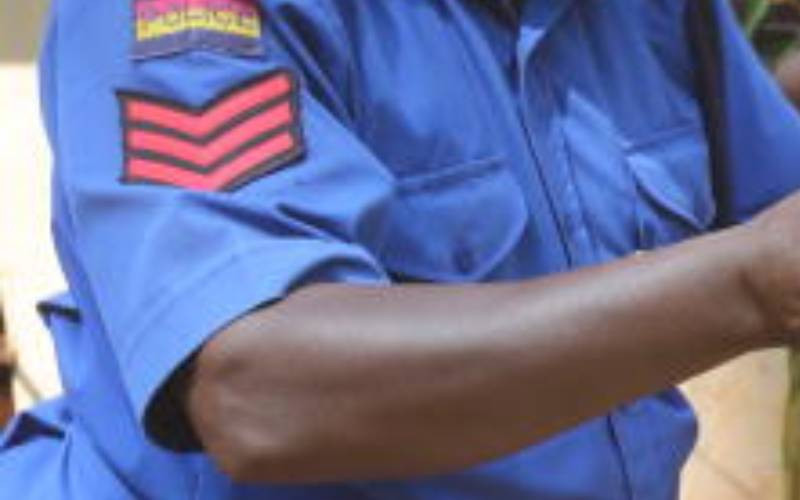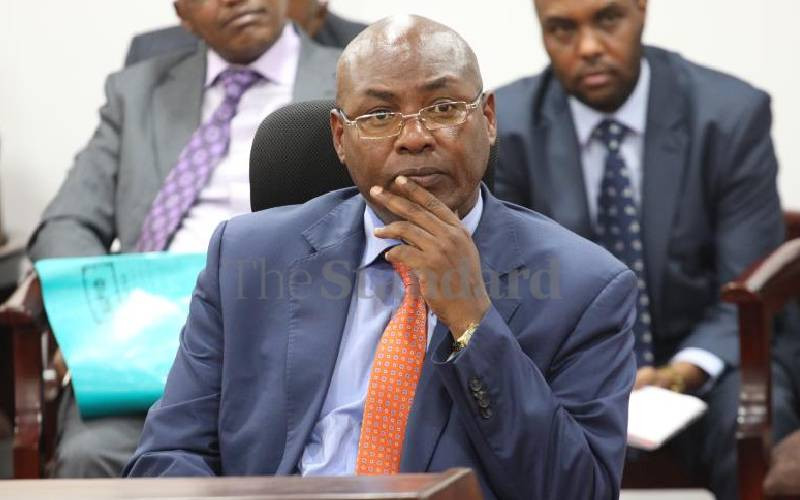
A joke told to describe corruption in society says what are the requirements for recruitment into the Kenya Police Service, and the answer is Sh200,000.
Well, that figure has jumped to Sh600,000 according to the task force of retired Chief Justice David Maraga, as inflation and cost of living leave no area intact. Recruitment appears like induction into a criminal enterprise.
Few expected a timid, bland or vague report from the bold, straight-talking Maraga and he definitely didn't disappoint. Right from the introductory paragraphs, the report goes straight to the crux of the matter saying, "Challenges facing the service were not just laws, policies, institutions and processes but leadership gaps. Reforms have little chance of being implemented without first boldly addressing the leadership issues".
The task force may have proposed vetting the top brass but just about everyone knows the inescapable outcome of such an exercise. Put another way, the Maraga team is advising, jump before you are pushed; resign quietly before you face public humiliation and embarrassment.
Police IG Japheth Koome had already inadvertently exposed himself as defective a few weeks back when he admitted in a public forum that a traffic officer offered him a share of his corrupt takings from roadside collections. Koome did not inform that gathering whether he had the officer arrested and most observers then felt that the IG was indeed not beyond suspicion, if not now, but perhaps in previous leadership positions.
But the task force didn't just criticise the leadership of NPS for being incompetent and lethargic in their responsibilities, they pointed fingers at the appointing authority. They claimed that the hiring of IG and his two deputies was neither transparent nor competitive as the Constitution and the law were not strictly adhered to. The appointing authority in this case is the same agency that appointed the task force, President William Ruto, and Koome's appointment was one of the first of the Kenya Kwanza administration in September 2022.
What was hinted in the report but not acknowledged satisfactorily was that when the top-ranking officers are appointed by the Executive without being competitively or transparently recruited, then their first loyalty and duty is to serve the interests of the state rather than provide security for the general public. That has been the unfortunate history and disaster of policing in Kenya from colonial times right up to the sixth decade of independence. If that reality is properly acknowledged then the three-fold difficulties that hamper the service of endemic corruption, underfunding and incompetent leadership are all symptoms of the decay that has its roots in the powerful Executive.
In other words, police corruption is tolerated by an Executive that is more corrupt but who in return depends on the officers to squash all protests and deny civic space as clearly evident in the past 12 months. That is an informal but understood agreement.
The Maraga task force also found fault with the National Police Service Commission (NPSC) for its laxity in carrying out its oversight role of the NPS. But this raises another concern, about their selection, integrity and competency. The same of course could be asked about all the other so-called independent commissions including KNCHR, NLC, EACC, NCIC and others. They too seem hampered by underfunding and incompetent leadership.
The Executive cannot stomach independent commissions that will hold them accountable, so the best-qualified candidates for these commissions are rarely appointed.
This brings us back to the task force report and the prospects of it being implemented. Piecemeal change even with the removal of the IG and his assistants as well as NPSC commissioners alone will not adequately address the rot.
What we are dealing with is a deeply ingrained police culture that will resist change even with better welfare, more qualified recruits and modernising the service. That culture of corruption, brute force and impunity must be dismantled and it can only begin with divorcing the force from the Executive and making it fully independent.
The writer is a Priest and Executive Director at Haki Yetu.
Stay informed. Subscribe to our newsletter
 The Standard Group Plc is a
multi-media organization with investments in media platforms spanning newspaper
print operations, television, radio broadcasting, digital and online services. The
Standard Group is recognized as a leading multi-media house in Kenya with a key
influence in matters of national and international interest.
The Standard Group Plc is a
multi-media organization with investments in media platforms spanning newspaper
print operations, television, radio broadcasting, digital and online services. The
Standard Group is recognized as a leading multi-media house in Kenya with a key
influence in matters of national and international interest.
 The Standard Group Plc is a
multi-media organization with investments in media platforms spanning newspaper
print operations, television, radio broadcasting, digital and online services. The
Standard Group is recognized as a leading multi-media house in Kenya with a key
influence in matters of national and international interest.
The Standard Group Plc is a
multi-media organization with investments in media platforms spanning newspaper
print operations, television, radio broadcasting, digital and online services. The
Standard Group is recognized as a leading multi-media house in Kenya with a key
influence in matters of national and international interest.






